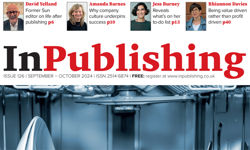It’s 100 years ago this year that the Royal College of Nursing was founded – the UK’s first professional organisation for trained nurses. Back then, the nurse’s must-have tool of the trade was a pin-on watch for their uniform; now, it’s more likely to be a mobile phone, such has been the magnitude of technological change in the past century.
Nursing Standard, the organisation’s magazine for members, began publishing in 1968. In 1987, a separate company was set up to focus on publishing to meet the varied and evolving needs of nurses. While Nursing Standard remains RCNi’s flagship title, claiming to outsell its nearest rival by more than three copies to one, it is now one of eleven nursing journals in the group. Gradual expansion has seen titles including Paediatric Nursing, Cancer Nursing Practice, Emergency Nurse and Disability Practice added to the fold.
Publishing went digital in 1996, with Nursing Standard Online launched initially as a free resource before becoming subscriber-only, as it remains. RCN Publishing recently relaunched as RCNi, reflecting the fact that its business has moved beyond publishing, with a strong calendar of events, books and educational material to keep nurses informed, inspired and on top of their need to revalidate their qualifications.
Managing director Rachel Armitage joined RCNi last year, having previously worked at the British Medical Journal and most recently at Elsevier, where she was director of eEducation since 2012.
Education
The educational link is especially important given RCNi’s recent launch of RCNi Learning, an online interactive tool for both student nurses and qualified nurses in the UK and overseas. It is designed to help nurses meet their legal requirements for training, and to bridge the gap between theory and practice. It consists of hundreds of learning modules as varied as ‘diabetes’ and ‘communication skills’, and presents information, case studies, podcasts, how-to videos and tests. Course content is evidence-based and peer-reviewed, and users can dip in and out of units at their convenience.
“We felt it was important that as an organisation, RCNi could support nurses in their learning and revalidation needs,” Armitage says. The product is subscription-based and is sold in addition to access to other resources and publications.
Events
The RCN is the world’s largest nursing professional body, with 435,000 members. In addition to publishing and education, events are a significant and growing part of what RCNi offers to members. Jobs fairs are held around the UK each year, and there are conferences, workshops in specialist areas of nursing such as mental health and cancer, and round-table events bringing together key thought leaders to discuss a range of issues affecting nursing.
Armitage says the combination of face-to-face events, print publishing and online resources meets nurses’ changing needs for information and connections throughout what is a strong nursing community. The jobs fairs enable nurses to look at opportunities for career progression but also to see what educational services are available, and to talk to the RCN about any professional concerns they might have.
RCNi also runs the annual Nursing Standard ‘Nurse of the Year Award’, which was launched in 1988. The competition is an important fixture on the industry calendar and is widely recognised, with winners frequently being invited to Downing Street to meet MPs and ministers.
Journals
“The journals are our mainstay, and the growth areas for us are in career services, jobs fairs and events, so this year we’ve made a big, strong push into education with the launch of RCNi Learning, and then in April, we’ll be launching a new RCN bulletin jobs board for nurses as well. We hope that all these new services will become a greater proportion of the business.”
RCNi is planning to relaunch all of the company’s journals in the latter half of 2016; they are already mobile-ready, but the relaunch will emphasise the importance of mobile-readable content.
Mobile
“Mobile is particularly important for nurses because they’re often not office-bound and mobile usage, in comparison to the medical profession, for instance, is especially high, so our strategy is to make sure that we develop for mobile first,” Armitage says. “As well as better signposting and some shorter-form content, if you want to read more, you can click through for more in-depth content. It’s not just about short-form content, it’s about offering different types of content to meet different needs at different times.”
It’s also important that digital content can be accessed while users are offline, because nurses are often working in places with patchy Wi-Fi, or they’re out and about in the community in places where they can’t get connected. “They’re reading during breaks, in the evening, and also very often at home or when they’re on the move – on the tube or the train – so that’s another reason why offline is important.”
RCNi.com was awarded the Digital Brand of the Year (Business) award at the PPA Digital Awards in November last year; a growing digital presence makes it easier for the brand and its content to grow not just in the UK but also internationally, in partnership with the RCN. RCNi currently has overseas subscribers, but does not publish in international territories. “Our intention is that we really develop and grow that international business, whether that’s through our journals or through our events, and Learning is going to be launched on the international market,” Armitage says.
Digital-first
“Our vision is to inspire the nursing community and we want to do that by providing educational resources to help them develop themselves and also by connecting that community,” Armitage says. “Our strategy very much is a digital-first model and I think over the next few years, we’ll see RCNi publishing many more digital products and services to meet the needs of nursing teams.”
None of the RCNi titles has withdrawn from print to become digital-only. Yet. “That may happen,” Armitage says. “At the moment, our customers want the digital and the print experience; they deliver different things. Over time, we may move to a digital-only model but that would be driven by the market.”
Diversifying the products and services offered to nurses means broadening the potential stream of revenue. While careers advertising tends to be quite steady, there are still peaks and troughs in line with changes in public health policy and more general economic conditions. Many of RCNi’s titles also carry consumer advertising, not just industry-specific ads, and demand for this advertising space is volatile, as it is for other publishers.
Subscriptions to new services, such as Learning, will start to provide a counterbalance to advertising, and live events generate sponsorship revenue.
Doctors and nurses
Having worked in publishing for doctors with the British Medical Journal, Armitage says there are many similarities between the two audiences.
“Fundamentally, what nurses are trying to achieve in terms of delivering high-quality care and improving patient outcomes is the same whether you’re a doctor or nurse or anyone on a medical team; it’s how you go about that that’s different.”
“Doctors and nurses very often want the same thing in that they want to keep up to date, they want access to educational tools and resources, they want decision support, they’re also ambitious in terms of their career development and they want to make a difference.”
Armitage has also been struck by the strong sense of community among nurses. “Within nursing, there really is a sense of being ‘all in it together’. They really do appreciate this sense of community and we aim to champion and connect that community, and provide them with the tools that they need for education or keeping up to date, and incorporate that in their day-to-day work.”
The dominance of mobile among nurses is a key difference between the way doctors and nurses consume media, Armitage says, and this coupled with the sense of community nurses feel means social media is an important way for RCNi to engage with its readers, whether that’s through surveys on issues such as pay and conditions, Twitter and Facebook.
“It’s about engaging with the readers, to really test the temperature and understand what their needs and pain points are and make sure that the content of our journals really meets their needs,” Armitage says. “As with doctors and teachers, nurses are time poor, so to be able to get the essence of something and ‘what does it mean for me’ immediately is important, and we do focus also on providing a much deeper reading experience online and in print for when they have more time.”
Managing Director: Rachel Armitage
Launched: 1987
Newest launch: RCNi Learning
Best-known brands: Nursing Standard, Emergency Nurse, Nursing Management
Turnover: £14.3 million (2014 figure for RCN Publishing, the forerunner to RCNi)
Employees: 109












